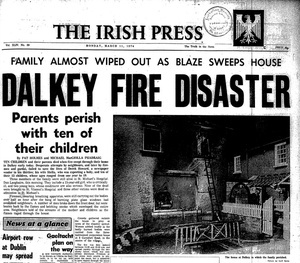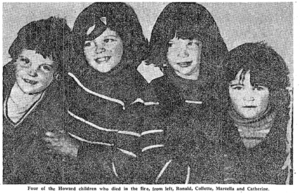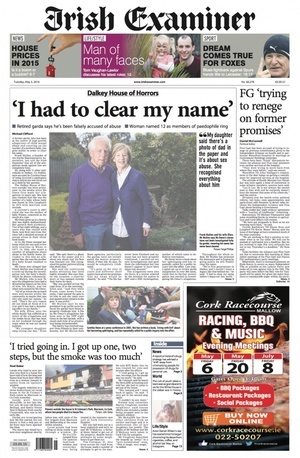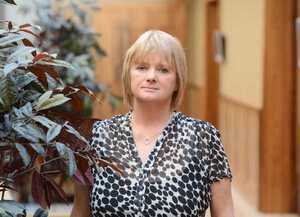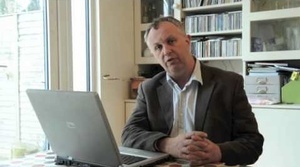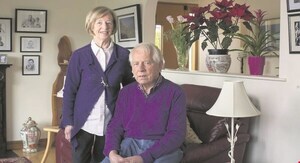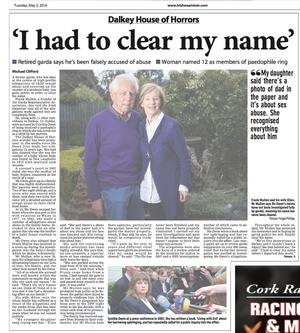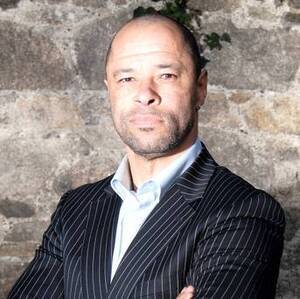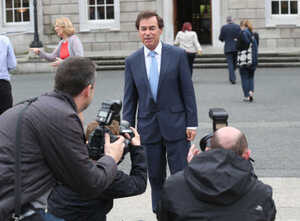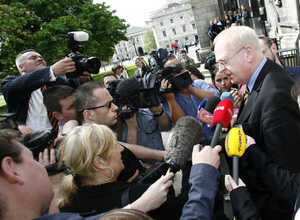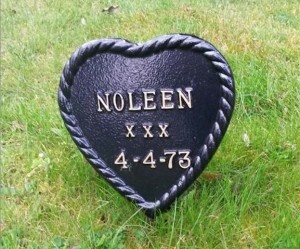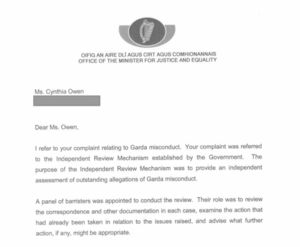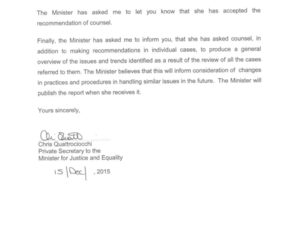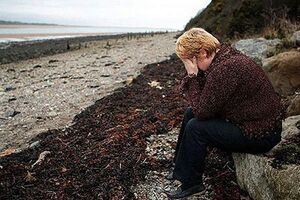
Cynthia Owen
Cynthia Owen recently used Facebook to name the people she said were among a paedophile ring operating in Dalkey, Co. Dublin, that abused her in the 1970s.
In 2007, the then Justice Minister Michael McDowell appointed Patrick Gageby SC to review the Garda investigation into the death of Cynthia’s daughter Noeleen Murphy, whom Cynthia gave birth to when she was just 11, in 1973.
Mr Gageby, who was to see if the public interest required the matter to be taken further, found this not to be the case.
A recent Independent Review Panel, set up by Justice Minister Frances Fitzgerald to look into allegations of Garda misconduct (following allegations made by Sergeant Maurice McCabe and former Garda whistleblower John Wilson), looked into the Gageby Review and concluded that they agreed with Mr Gageby’s findings.
A vigil was held at the weekend outside Leinster House in memory of Cynthia’s daughter.
Below is a timeline of significant events in Cynthia’s story to date and below Cynthia writes about her fight for justice.
1961: Cynthia Owen (nee Murphy) is born to Peter Murphy and Josephine (“Josie”) Murphy. The family reside at 4 White’s Villas, Dalkey. He is a familiar figure in the pubs around Dalkey and, in later years, he would become the caretaker of the Town Hall in Dalkey.
1968-9: From the age of 7, Cynthia is anally and vaginally raped by Peter Murphy. She is also abused by her mother, Josie Murphy, various members of her extended family and by a man who visits the family home and rapes her with the consent of her parents in return for payment. This man, known as Ken, would later form part of the paedophile ring that abused her.
1971: A 10-year-old Cynthia is taken by her mother at night to a house, near her home where she is raped by a number of local men with the consent of her mother. The next day Cynthia is sent around to the businesses of some of the men concerned to collect items and money. The rape in the house recurs on a monthly basis and continues after Cynthia gets her first period at the age of 10. She also continues to be abused by her father and other family members.
1972: Shortly after her 11th birthday, Cynthia experiences the first symptoms of pregnancy. She is informed by her mother that she is having a baby and that this must be kept secret. On her mother’s instructions, Cynthia continues to attend school throughout her pregnancy, concealing her figure under a coat worn at all times. Mother Dorothy, the school headmistress, accosts her and asks if she is pregnant, but Cynthia, who does not fully understand the word ‘pregnant,’ denies this. In response, Mother Dorothy makes Cynthia sit with her back to the class.
April 1973: Cynthia gives birth to a baby girl, Noleen Murphy, at White’s Villas. Immediately after her birth, Noeleen is stabbed to death by Josie Murphy using a knitting needle. In the early hours of the morning, two of the men from the paedophile ring, one of them a Garda, are waiting in the garden to enter the family home to help clean up the scene.
Josie sets off with Cynthia on foot to Dun Laoghaire to dispose of Noleen’s body. On the way, they meet two members of the Gardaí who question them but accept Josie’s statement that they are on the way home from visiting relatives.
Noleen’s body is found that evening by two local boys in Lee’s Lane, Dun Laoghaire, where she had been left by Josie and Cynthia. The Garda spend just six weeks on the murder case, and then downgrade it to infanticide. Neither Cynthia nor her family are ever interviewed as part of this investigation. An inquest into Noleen’s death is postponed indefinitely, and she is buried in a communal grave in the Holy Angels plot in Glasnevin Cemetery. The abuse of Cynthia by family members and local men continues as before.
1976: Cynthia becomes pregnant for the second time and leaves school. In June, she gives birth prematurely to a stillborn boy, John Murphy, and her family bury his body in the back garden of 4 White’s Villas.
1981: Cynthia marries and leaves home.
1982: Cynthia’s younger brother, Martin Murphy, makes his first suicide attempt and is admitted to hospital.
1990: Cynthia, living in England and in a new relationship, attends counselling to deal with recurring anxiety arising from her childhood experiences.
1991: Cynthia receives a visit from her niece Theresa Murphy, daughter of her older sister Margaret Stokes but brought up as the child of Peter and Josie Murphy, who tells her that she and her brother were repeatedly abused by Peter Murphy as children.
April 1994: Cynthia makes a statement to the North Yorkshire Police about her childhood abuse.
January 1995: Martin Murphy dies by suicide at 4 White’s Villas.
April 1995: Cynthia contacts Dun Laoghaire Garda Station and makes a full statement about the circumstances of Noeleen’s death. The investigation is re-opened, but Peter and Josie Murphy, when arrested and questioned, deny Cynthia was ever pregnant.
June 2002: Another younger brother of Cynthia, Michael Murphy, goes missing. He had been suffering from depression prior to his disappearance.
April 7, 2003: Carol Coulter, in The Irish Times, reported:
“Miscarriages of justice can and do occur with sexual offences, according to a leading senior counsel. Mr Patrick Gageby SC told a conference there was a particular danger of this happening when the case relates to old offences. In more recent cases there was usually forensic evidence which could be of help to the accused as well as to the prosecution. But this did not exist with old cases. Mr Gageby said there was also a subversion of the presumption of innocence with old cases. People asked why a person would “say such a thing” if the offence had not happened. It was important that old cases be carefully investigated, and that collateral matters be examined. Giving an example from his own defence experience, he said he had a case where the victim described being abused in a neighbour’s house, and had a vivid memory of a floral-covered couch in the room. It emerged on investigation this couch was in his own home, not the neighbour’s. He warned that cases up to 40 or 50 years old might be given a credence they did not deserve. Judges should give carefully worded warnings to juries when they were summing up old cases. Proper and full disclosure was vital, he said. The gardai were not there primarily to help the victim, but to assist in the administration of justice.”
February 1, 2005: Michael Murphy’s remains are found by builders near Killiney Dart station, close to the Killiney Court Hotel where he was last seen. An earlier Garda search in the area had failed to uncover his body. An inquest into his death returns an open verdict due to a lack of evidence. It is read into the record at the inquest that Michael was an abuse victim.
February 23, 2005: Theresa Murphy dies by suicide. She leaves behind a 37-page document containing graphic accounts of sexual abuse at 4 White’s Villas. An inquest into her death, finds that it was contributed to by sexual abuse by unnamed family members.
May 30, 2005: At the National Prosecutors Converence Senior Counsel Patrick Gageby – a Senior Counsel with a long history of representing defendants in sexual offence cases – suggests a limit of 15 years on criminal proceedings taken against those accused of sexual abuse, saying that the media is “wholly uncritical” of the redress and compensation system for victims of institutional abuse with almost “uncritical” acceptance of everything an alleged victim says.
May 30, 2005: Carol Coulter, in The Irish Times, reports that “leading defence counsel” Patrick Gageby SC was calling for a limit on the time allowed to elapse between an alleged sex crime and the prosecution of the suspect as there was a danger the accused could not receive a fair trial.
June 2005: The garden at White’s Villas, no longer occupied by the Murphys, is excavated by Gardaí but the remains of Cynthia’s stillborn son John Murphy are not found.
September 2005: Following representations from Cynthia’s solicitors,the inquest into Noeleen Murphy’s death is re-opened. It had taken Cynthia and her legal team eight years to get the inquest re-opened.
June 2006: The Director of Public Prosecutions states that he does not intend to take any criminal proceedings in respect of the death of Noeleen Murphy.
June 2006: Dublin City Coroner Kieran Geraghty, presiding over the re-opened inquest into Noeleen’s death, writes to the Minister for Justice Michael McDowell requesting the exhumation of her body. Following receipt of strong objections from the Dublin Cemeteries Committee, the voluntary, independent body that owns and operates Glasnevin cemetery, McDowell turns down the request saying that he “cannot stand over an exhumation project which would cause such extensive distress and face such an uncertain outcome.”
August 2006: Josie Murphy dies.
February 2007: At the inquest into Noleen’s death, contemporaries of Cynthia Owen give evidence that she had been visibly pregnant in school at the age of 11. Cynthia and her sister Frances Murphy give evidence of persistent and repeated sexual abuse by family members including their brother Peter Murphy Junior, who waives anonymity to deny the allegations against him.
Two other sisters, Catherine Stevenson and Esther Roberts, admit sexual abuse by family members.
Margaret Stokes, mother of Theresa Murphy, denies ever having been abused but admitted that she once suffered a miscarriage in White’s Villas which her mother flushed down the toilet when she was 13 years old.
In a statement provided for the purposes of the inquest, but not made public by the Coroner, Cynthia Owen lists the men alleged to have been part of the group which had abused her, seven of whom are still alive and live in Dublin, and which include three members of the Gardaí.
The inquest also hears evidence regarding the original 1973 investigation. The jury are told that the investigation lasted a mere six weeks; that no blood samples were taken from Noleen’s body; that several items are missing, along with the plastic bag in which she had been found and its contents, from which no forensic samples had been taken. Half the investigation file has disappeared. In the remaining file is a written statement purportedly executed by Eddie Russell, former Dun Laoghaire station sergeant, confirming sight of Noleen’s body, which Mr Russell denies having executed, disputing its accuracy. No attempt is made by Counsel for An Garda Síochána to challenge Mr Russell’s denial.
February 17, 2007: The jury at the inquest into the death of Noeleen Murphy unanimously find that she was the child of Cynthia Owen; that she died at the family’s former home in White’s Villas in Dalkey; and that her cause of death was haemorrhage due to stab wounds. Having been told by the Coroner that they cannot return a verdict of unlawful killing as it would “implicate people” in criminal activity, which is outside the remit of an inquest, they return an open verdict in relation to the cause of death.
February 19, 2007: Responding to the inquest verdict, Michael McDowell states that he wants a full report from An Garda Síochána into its handling of the investigation into the death of Noeleen Murphy
February 19, 2007: Alan Shatter, solicitor and politician, recommends a full review of the Garda investigation. Mr Shatter raises once again the possibility of exhumation, stating that “DNA fingerprinting has reached a level of sophistication where, if the Government and An Garda Síochána were prepared to meet the cost of this, there’s a real possibility that the remains of this child be distinguishable from other remains… and might provide very cogent and important evidence, which I think would give rise to the possibility of a future criminal prosecution.”
February 25, 2007: In an article published in the Sunday Tribune, journalist Justine McCarthy states that one garda, who worked on the investigation and who took statements from witnesses, was known to be a friend of Cynthia’s father. She also stated that another journalist, Brigid McLaughlin, who had written about Cynthia’s case, had been told by a member of the Dalkey rowing club that she would ‘end up in the sea’ if she continued to do so.
February 26, 2007: Michael McDowell announces that he has appointed Patrick Gageby SC – a Senior Counsel specialising in sexual offence cases – to review Noeleen’s death “on the basis of all the available papers on what is known in relation to the case and the garda investigation to see if the public interest requires the matter to be taken further.”
May 14, 2007: Peter Murphy and his daughters Esther, Margaret and Catherine issue judicial review proceedings in the High Court challenging the inquest verdict on the grounds of bias on the part of the coroner due to a predisposition to believe Ms Owen’s evidence. Questions are asked as to how Peter Murphy can fund the legal fees from the inquest and now a High Court case.
September 28, 2008: The Gageby report into Noeleen’s death is delivered to the Minister for Justice. It advises against a public inquiry, apparently because of the legal difficulties that would be brought about by the serious allegations made against certain people, and because of the amount of time that has elapsed since the death. To date, the report has not been made public.
December 12, 2009: Peter Murphy dies leaving an estate of €90,000.
June 2009: At a briefing on protecting children organised by the ICCL in Leinster House, Mr Gageby expresses the view that most cases involving under-age sex concerned people of roughly the same age rather than “flocks of paedophiles in dirty macs.”
March 12, 2010: The Murphy family withdraws their challenge to the inquest verdict following an acknowledgment by the Coroner that this verdict did not implicate Cynthia’s sister Catherine Stevenson in any wrongdoing.
2011: Alan Shatter is appointed Minister for Justice.
April 2013: Gardaí commence a review of the events surrounding Noeleen’s death as part of a series of reviews intended to examine claims that paedophile rapists were able to use influence to hinder scrutiny of their activities.
April 13, 2014: Cynthia Owen hands a petition with 12,444 signatures into the Department of Justice in support of a public enquiry into Noeleen’s death.
30 April 2014: Richard Boyd Barrett TD tells the Dail that Cynthia Owen was ritually abused and raped by members of her family, the local community and “at least 3 Senior Gardai from the area,” and that “one of the people accused by Cynthia Owen as being one of the abusers was one of the gardaí who arrived on the scene when her baby was found.” Mr Boyd Barrett further reports that Patrick Gageby SC had stated publicly, at a national prosecutors’ conference, that he believed cases of rape and abuse more than 15 years old should not be investigated and that counsellors and psychologists working in this area usually gave unreliable evidence, making his examination of the original investigation ‘a travesty’. He also expresses concern about the failure to prosecute given that, on the finding of the jury at the inquest, a statutory rape must necessarily have taken place.
Alan Shatter, responding to Mr Boyd Barrett, states that he has sought a full report from Garda authorities prior to proceeding further. He also states that he is not in a position to overrule the view of the DPP that there is insufficient evidence to warrant the taking of a prosecution. He describes the allegations of bias made by Mr Boyd Barrett against Mr Gageby as defamatory and expresses the view that a public inquiry is likely to achieve little unless it results in a prosecution.
May 2014: Alan Shatter resigns as Minister for Justice and is replaced by Frances Fitzgerald TD
December 2015: The Department of Justice writes to Cynthia Owen informing her that no public inquiry will be carried out. Up to this point the case has been sent to the DPP eight times.
January 2016: Cynthia Owen names her abusers on her Facebook page, in an attempt to encourage other victims to come forward.
January 10, 2016: The Irish Mail on Sunday reports that the Independent Review Panel into alleged cases of garda misconduct, set up by Justice Minister Frances Fitzgerald following allegations made by former Garda John Wilson and Sergeant Maurice McCabe, has rejected more than 90 per cent of the complaints. Cynthia’s case was included in this review.
Sources: Irish Times, The Guardian, The Irish Examiner, The Sunday Independent, The Sunday Tribune, The Sunday Business Post, The Evening Herald, The Sunday World
Meanwhile,
Cynthia Owen writes…
I have been fighting for justice since 1995 and, to date, no one has has been prosecuted for these crimes committed against me. To date the case has gone to the DPP 8 times, with no prosecutions being recommended. I also tried to take a case to Europe but that failed too. At one point Alan Shatter was my lawyer for four years and he was looking at a civil case. He also was very vocal in the media and often called for a public inquiry into the case. But after he got into power he refused to help me.
Patrick Gageby refused to meet with me, the main witness, and did his review from speaking to the Gardaí at Dún Laoghaire where, at the time, my father’s friend was over the murder and abuse case – this particular police officer was also friends with three of the retired gardaí that abused me.
Despite all this, the Department of Justice have stood by this review, and to date have refused to give me a public inquiry.
More recently an Independent Panel Review was put together by the Department of Justice to look at 321 cases of Garda corruption, and my case was one of them. We were told we would have a decision in eight weeks, but the process took 15 months. Again, the Panel Review, made up of 5 solicitors and 2 barristers, did not interview or meet with any of the victims and, in the vast majority of the cases, no further action was recommended.
In my own case, the panel review admitted that while the Gageby Review was outside their remit, as they were supposed to be independent, they actually viewed the Gageby Review and said that they agreed with it, and then said that because the Gageby Review directed that no public inquiry be held into the matter, they felt that that was to be upheld.
Simply put, an Independent Panel Review, supposed to remain impartial, agreed with Gageby who had gained ALL of his information from the Garda who were friends with the men who abused me.
Fine Gael were actually proud of this Panel Review and boasted regularly in the Dáil that they were the first Government to ever set up a process to look at Garda corruption, but then went on to ignore the seriousness of the cases involved and refused to open a Commission of Investigation into the cases, which is the only way the victims in these cases will ever get any real answers about their loved ones.
In the very small percentage of cases that saw recommendations, some of them were recommended to go to the Garda Ombudsman, an avenue the victims could have pursued themselves without waiting 15 months to do so. Or some of them went to the Garda Commissioner for a report, again another avenue that a victim can explore themselves.
I am in regular touch with some of the other victims and I can say that we are literally devastated by the way we were treated by the Independent Panel Review. We had all really pinned our hopes on this process, but now feel shattered and completely disillusioned and let down all over again. Most of us had to wait 15 months to find out our cases were being ignored and some of us even got the letter on Christmas week, which is an awful time for those of us who have lost loved ones.
We have called for Frances Fitzgerald to resign and believe that she should be ashamed of how she treated us as a whole.
I have written to every member of the Dáil to ask them to commit to me in writing. I will be asking them that, should they be elected, will they give me the inquiry this case deserves. I intend to make public their response in the media on January 17.
A petition has been opened to call on Frances Fitzgerald to ignore the panel review’s recommendation and to give me the inquiry this case deserves. Please sign and share my petition link on social media.
Cynthia’s Facebook page can be visited here





